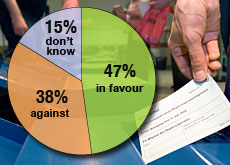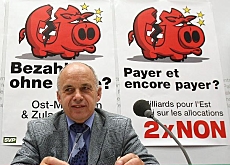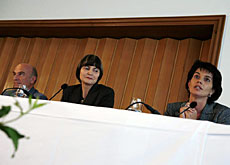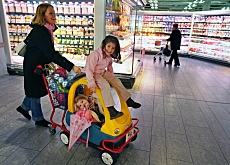Poll finds voters approving funds for Europe

Supporters of a proposal to contribute SFr1 billion (SFr800 million) towards the ten new European Union member countries appear to have the upper hand.
An opinion poll ahead of a nationwide ballot on November 26 also found a clear majority in favour of unified minimum child benefits.
According to a survey by the GfS Bern polling institute, 47 per cent of those interviewed said they approved of a government proposal to pay SFr1 billion over ten years to the ten new EU member states.
The funds are aimed at closing the gap between rich and poor countries in the extended EU. The ten states which joined on May 1, 2004 are Poland, the Czech Republic, Hungary, Slovakia, Slovenia and the three Baltic republics, as well as Malta and Cyprus.
Thirty-eight per cent of respondents came out against the payment, while 15 per cent said they were undecided.
Experts say the figures reflect similar patterns in previous ballots on foreign policy.
Supporters of the rightwing Swiss People’s Party, which forced the referendum, and citizens in rural regions tend to reject the plan, while the three other main parties lean towards approval.
Familiar pattern
The poll shows no significant differences between the country’s three main language regions.
The funds are part of the law on aid to eastern Europe which came into force in 1995 and is up for renewal. The money is to be spent on a series of projects chosen by Switzerland and focusing on environment, education and internal security.
Switzerland is not a member of the EU, but it has concluded 16 bilateral accords with the EU covering a wide range of issues including labour, trade, transport, taxation, immigration, asylum and customs.
Moves are also underway for a deal on electricity and a free trade agreement on agriculture.

More
EU bilateral accords
Child benefit
The second issue due to come to a vote appears to be less controversial just over five weeks ahead of polling day.
Sixty-nine per cent of respondents came out in favour of a unified child benefit system across the country which would go against the current federalist system.
The Association of Small and Medium-Sized Businesses has challenged the plan approved by parliament earlier this year.
It would standardise the widely differing solutions to a certain extent, but the country’s 26 cantons would still be free to offer individual benefits on top.
Just over 20 per cent said they would reject the proposal while the remaining ten per cent are undecided.
The People’s Party and the centre-right Radical Party have recommended a “no” vote, while the centre-right Christian Democratic Party and the centre-left Social Democratic Party have been campaigning for a “yes”.
Under the proposal, parents can claim a minimum of SFr200 a month in child benefit and SFr250 for children above 16.
swissinfo, Urs Geiser

More
Referendum
Aid for eastern Europe/SFr1 billion funding package: 47% yes, 38% no, 15% undecided.
Standardised child benefits: 69% yes, 21% no, 10% undecided.
Expected turnout: 43%
The poll is based on interviews with 1,235 people across Switzerland.
It was carried out more than six weeks ahead of polling day on November 26.
A second similar poll is planned for next month.
Since 1990 Switzerland has spent SFr3.5 billion on about 1,000 aid projects in eastern Europe after the collapse of communism.
So far non-EU member Switzerland has agreed 16 bilateral treaties with the 25 EU member states, including the ten countries which joined in 2004.
The government says the SFr1 billion over the next ten years is to go to projects chosen by the Swiss and not by Brussels.
It is financed through the budgets of the foreign and economics ministries as well as the regular federal budget.
Parliament approved the payment of a uniform monthly SFr200 child benefit and SFr250 for children above 16. The rule doesn’t apply for parents who are self-employed.
The money is to come from employers and partly from government funds.
The business community and parts of the political right collected more than 50,000 signatures to challenge the decision in a referendum.

In compliance with the JTI standards
More: SWI swissinfo.ch certified by the Journalism Trust Initiative




You can find an overview of ongoing debates with our journalists here. Please join us!
If you want to start a conversation about a topic raised in this article or want to report factual errors, email us at english@swissinfo.ch.